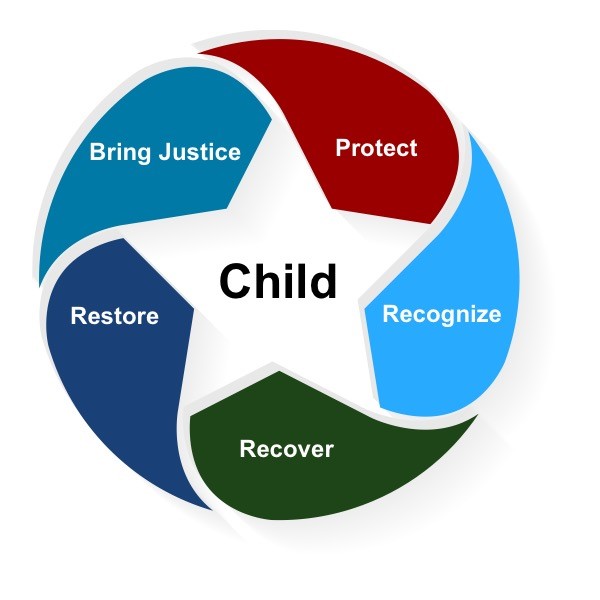Need to Know: The Governor’s Child Sex Trafficking Team
Below is a guest post from Andrea Sparks, the Director of the Child Sex Trafficking Team in the Governor’s Office. Andrea and her team are doing tremendous work to prevent victimization of children into child sex trafficking, partner with stakeholders to identify and recover survivors, provide coordinated services to help them heal and thrive, and bring them justice. Please take a moment to read the guest post below – this is information that every Texan needs to know.
- - - - - - -
Governor Abbott has proclaimed January as Human Trafficking Prevention Month in Texas, urging Texans to work together to protect the vulnerable, help victims find healing, and bring offenders to justice. While Texas is a national leader in the fight against human trafficking, human trafficking victims, including the estimated 79,000 child and young adult victims of sex trafficking in Texas, are counting on all of us to ramp up our efforts to help them find freedom and justice.

The Governor’s Child Sex Trafficking Team (CSTT) exists to educate and empower Texans to do just that. Our vision is a state where children are free from sexual exploitation. Our mission is to help prevent victimization, to identify and recover victims, to provide them coordinated services that help them heal and thrive, and to bring them justice by holding their exploiters accountable. We do this by working with public and private partners across Texas and, because human trafficking knows no boundaries, beyond Texas.
To help protect children, we are funding prevention programs at Boys and Girls Clubs across Texas and plan to reach more children this year through partnerships with the Department of Family and Protective Services (DFPS), the Texas Education Agency, and faith communities and nonprofits. We are leading efforts with DFPS, the Texas Juvenile Justice Department, runaway and homeless youth shelters, and other child-serving organizations to implement a screening tool to identify more of the victims who so desperately need help. We are partnering with the Texas Regional Office of the National Center for Missing & Exploited Children and the Department of Public Safety to train law enforcement and child welfare stakeholders to recognize the signs of exploitation and respond accordingly.
Regionally, we are working with local governments, law enforcement agencies, prosecutors, judges, juvenile probation departments, physical and behavioral healthcare providers, children’s advocacy centers, rape crisis centers, faith communities, and other partners to develop five regional continua of care that, together, will form a statewide network to serve child victims. Each region will have the tools, training, and services needed to ensure that victims are recognized, recovered, and given the trauma-responsive services needed to heal and thrive in the short and long-term. Each region will also have the support of a Governor’s office employee on-site to serve as Regional Administrator.
We are also providing funding and support to fill common gaps in victim services around the state with promising practices:
- Advocate programs that provide crisis response, personal advocacy, trust-based relationships, and long term case management;
- Drop-in centers where youth can get their basic needs met, develop healthy relationships and get the counseling and other supports they need to break free from exploitation; and
- Specialized emergency and long-term residential services for those youth who cannot be provided safety and healing at home.
All programs and partners will be trained in trauma-informed and responsive care and how to build trust-based relationships with survivors to counteract the trauma bonds that traffickers use to enslave their victims.
We are also developing local care coordination teams and processes so that no child or family will have to try to find or navigate services on their own. Care coordination teams will ensure that each child receives the individualized services and supports they need from recognition and recovery to long term services to help them move from surviving to thriving. The first of these care coordination teams will launch this year in Texas’ largest trafficking hotspots – Harris, Dallas, Tarrant, Bexar and Travis Counties – with many more to follow.
To bring victims justice, we are working with stakeholders to fund and support increased investigations and prosecutions of traffickers and buyers of trafficking victims, and to support enhanced training for the criminal justice system statewide.
To accomplish all of this and more, we need every Texan to join our Team.
We need YOU to join our Team.
What can you do?
- LEARN more about our work and sign up to receive our email updates and calls to action.
- EDUCATE yourself on the indicators of trafficking and if you see something, say something. If it is an emergency or you believe someone is in immediate danger, call 911. If not, call the National Human Trafficking Hotline at 1-888-3737-888. The hotline is staffed 24/7 with people trained in recognizing and identifying trafficking. They can help you make sense of the information that you have and recommend next steps.
- SHARE what you learn with colleagues, friends, and family. Share this information in person and on social media.
- PREVENT child sex trafficking by being an advocate, mentor or tutor to a vulnerable child. Become a CASA volunteer advocate, a Big Brother/Big Sister or volunteer at your local Boys and Girls Club or Communities in Schools.
